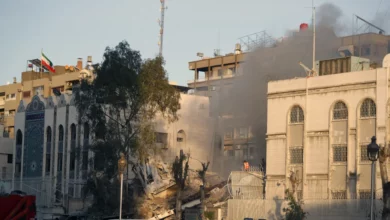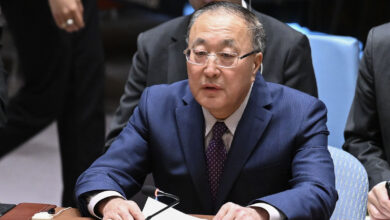BEIRUT — Syria's embattled president will give his first speech Tuesday since he agreed last month to an Arab League plan to halt violence.
State-run media say Bashar al-Assad will talk about "domestic issues" and regional developments.
Assad has made few public appearances since the anti-government uprising began in March. The regime's crackdown on dissent has killed thousands and led to international isolation and sanctions.
Syria agreed in December to the Arab-brokered plan that calls for an end to the military crackdown on protesters, but killings have continued. About 165 Arab League monitors are in Syria to determine whether the regime is abiding by the plan to stop violence and pull heavy weapons out of the cities.
On Monday, Syrian troops fired on protesters in the restive city of Homs as Arab League observers toured the area to see whether Assad's regime is abiding by its pledge to halt the 10-month-old crackdown on dissent, activists said.
In the capital Damascus, thousands held prayers for those killed since the uprising began in March. Christian and Muslim religious leaders attended the service, and throngs packed the city's Holy Cross church, its yards and a nearby street.
"Enough killings in our beloved Syria," the country's top Sunni clergyman, Grand Mufti Ahmad Badreddine Hassoun, told the crowd at the prayer service. His son was shot dead in October.
The 165 foreign monitors are supposed to be ensuring that Syria complies with the Arab League plan stipulating the regime stop killing protesters, remove heavy weaponry, such as tanks, from all cities, free all political prisoners and allow in human rights organizations and foreign journalists. Syria agreed to the plan on 19 December.
However, the crackdown has not stopped and opposition activists say around 450 people have killed by the regime since observers began work on 21 December. On Monday, the British-based Syrian Observatory for Human Rights said security forces shot dead four people around the country and returned the bodies of 10 other people to their families in several Homs neighborhoods.
Syrian state TV said that Assad will deliver a speech at noon Tuesday addressing "local and international developments." Assad has few public appearances since the uprising began, and it will be his first comments since Syria agreed to the Arab League peace plan last month.
The UN estimated several weeks ago that more than 5,000 people have been killed in political violence since March. Since that report, opposition activists say hundreds more have died.
On Sunday, the Arab League repeated its demand for the Syrian government to immediately stop all bloodshed.
It was not immediately clear whether the foreign observers witnessed the regime forces opening fire in the Khaldiyeh neighborhood of Homs. Several people were reported wounded.
Majd Amer, an activist in Homs, said the shooting started after thousands of protesters surrounded a group of observers, urging them to go to Khaldiyeh, where anti-regime protesters are known to be active. The observers' Syrian escorts wanted to take them to the nearby Abbassiyah neighborhood, where many regime supporters live, he said.
"Sporadic shooting was heard for a few seconds," Amer said.
The opposition has accused Syria of trying to mislead the activists by showing them areas where regime support is strong.
Arab League Secretary General Nabil al-Araby said Sunday observers will continue their monthlong mission in Syria, despite claims by activists that the mission is giving cover to Assad's crackdown on protesters and delaying further action against the regime in forums such as the UN Security Council.
Some members of the Syrian opposition criticized the Arab League for not withdrawing the observers.
An opposition group called the Syrian Revolution General Commission said the Arab League stance "equates between the victim and the executioner" and called for the League to refer the issue to the UN Security Council.
But Abdul-Aziz al-Kheir, a spokesman for the National Coordination Body for Democratic Change in Syria, said the presence of observers has reinvigorated the uprising in the past two weeks and decreased the number of protesters killed.
"Any talk of foreign intervention is an illusion, the Arab League initiative is the only way forward," he said after meeting with Araby in Cairo Monday.
Adnan al-Khudeir, head of the Cairo operations room that the monitors report to, said more observers will head to Syria in the coming days and the delegation should reach 200. He said the mission then will expand its work in Syria to reach the eastern province of Deir al-Zour and predominantly Kurdish areas to the northeast.
The regime's crackdown has led to worldwide condemnation and sanctions, weakened the economy and left Assad an international pariah just as he was trying to open up his country and modernize the economy.
Turkish Prime Minister Recep Tayyip Erdogan warned Monday that the Syrian conflict is sliding toward "civil war" and said it must be stopped. At a joint news conference in Ankara, Norway Prime Minister Jens Stoltenberg said there is a need to increase international pressure to force to step down because of massacres by his regime.
The Syrian government says that the turmoil is not an uprising but the work of terrorists and foreign-backed armed gangs.
Activists and observers deny that.




